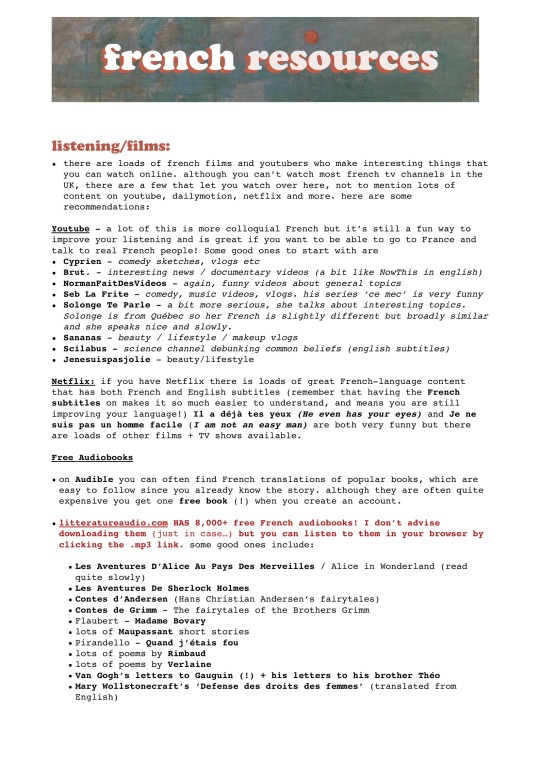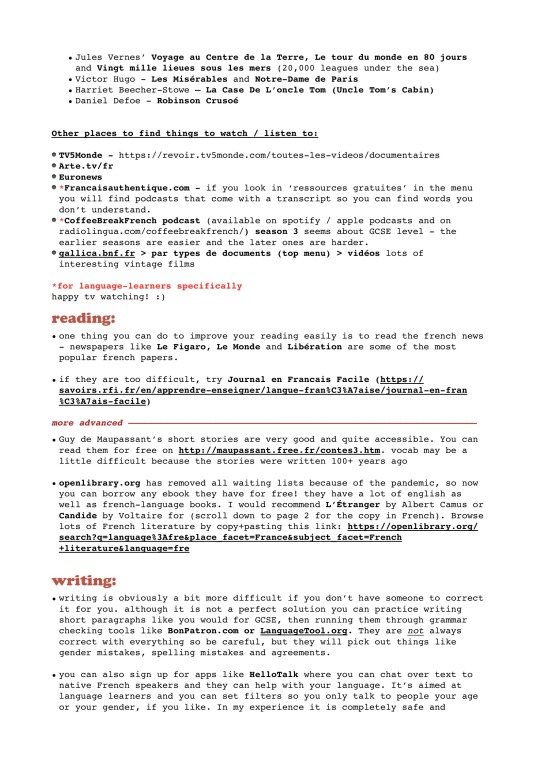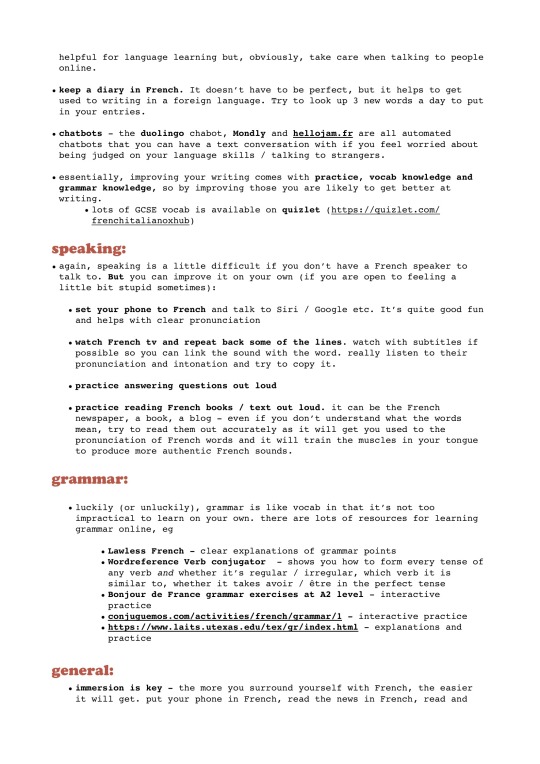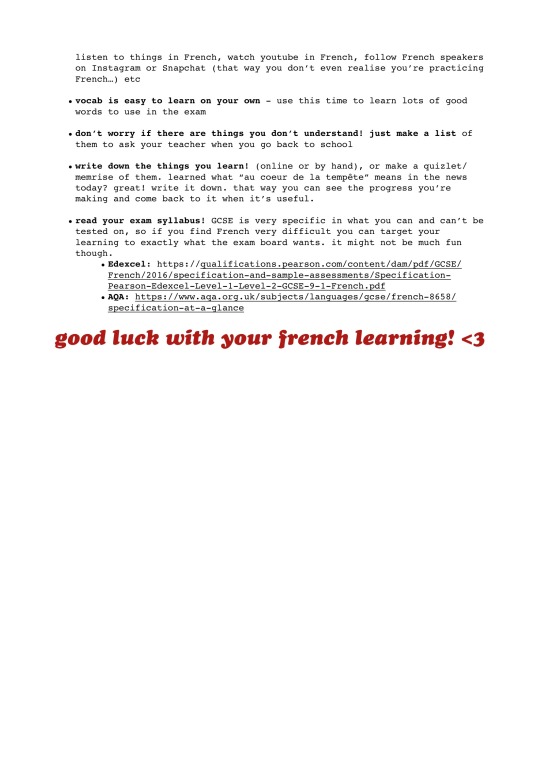Don't wanna be here? Send us removal request.
Text
Learning to like Physics
I actually cannot believe how much I used to hate Physics until last year, but then I actually took the time and effort to understand it and?? it’s so cool and fun and easy?? unreal.
It literally seemed impossible for me and I legit thought I wouldn’t be able to graduate because I was never gonna pass Physics (I’m a Math major so we actually have 4 required Physics courses). I don’t know what the point of this is but, don’t be afraid of Physics guys!! (or any other subject!!) yes it’s frustrating as hell and you feel dumb for not having a clue about what is happening or how to work out the problems but I swear once it clicks for you (and it will) it’s gonna be great.
So if anyone needs a step by step (for college/uni), here’s one:
Google is your best friend, the internet has plenty of videos/papers/worked out problems for you to check out. The most important thing to look for is drawings and videos that help you visualize what’s going on. In most of general physics, the key is to see what forces are acting, and from that follows everything else.
Know your core equations. Honestly it’s always the same ones in the end.
For mechanics: you absolutely gotta know Newton’s Laws, Work and its relation to Kinetic/Potential Energy. Momentum is also important.
For thermodynamics: First and Second Law of Thermodynamics; pV = nRT, Boyle/Gay Lussac etc (note that they’re all connected), Carnot’s Cycle.
For electromagnetism: Maxwell’s equations. This is as far as I’ve gotten in my studies.
Understand where the formulas come from, rather than learning them by heart. For me, this was necessary because my memory is absolutely shit so there was no way I could remember every variation. But most of the formulas actually do make sense, and once you’ve drawn out a diagram of what’s happening, you can work them out yourself.
For the previous point, I suggest you watch and rewatch your professor’s explanation until you get the gist. Don’t get discouraged if it’s not immediately crystal clear, seek out other explanations if you need to. Then try to do it yourself.
ASK. FOR. HELP. I cannot stress this enough, do not feel ashamed about asking questions in class or during office hours. There are no stupid questions, and you’re paying thousands every year for people to teach you. Also physics is hard, so you’re pretty much expected to not understand immediately. Moreover, I can guarantee there’s at least one other person in the room with the same question who’s too afraid to ask. I was that person, and I failed the class because of it. Don’t be me.
Practice until you’re able to do most variations of standard problems. Once you’re able to do a certain problem, try to change it and see what happens. You don’t have to crunch the numbers all over again, go with your intuition first. Then you can calculate everything and see if you were correct.
This is all I’ve got at the moment. It applies to General Physics because I’m still pretty shit at Mathematical Physics (Rational Mechanics?) lmao, which is why I don’t talk about Lagrangians and such here.
If anyone has any other tips (for Mathematical Physics as well!) , please feel free to add them. Note that I’m from Italy, and this is what it was like for me. Other countries might have different ways of testing or focus on some formulas that I haven’t included. Do what works for you, obviously.
Good luck STEM students, I know it’s hard, but hopefully worth it in the long run :)
863 notes
·
View notes
Photo

Finding your way in the dark depends on your internal clock
How mammals perceive light changes between night and day. Researchers at Aalto University and the University of Helsinki discovered that mice were better at finding a dim light in pitch-darkness in experiments done at night time compared to ones done during the day time. The scientists were surprised to find that this effect had very little to do with any changes in the eye itself, and was instead controlled by how the mice actually searched for light in the dark, and how their brains processed signals at night vs. day. The results are exciting for neuroscientists interested in how animals and humans can see, and biologists interested in how the time of day alters our bodies, including sensory processing.
Many types of animals behave differently during day and night time. While the “body clock” has long been known, its effect on how different parts of the body function still aren’t fully understood. For instance, researchers knew that the retina, the part of the eye that detects light, has its own circadian rhythm. The team at Aalto and Helsinki Universities were interested in seeing if the eye’s internal clock affected vision, so they modified one of their previous experiments to find out.
‘Our research group is able to link if a mouse can find a dim light in the dark to the mouse’s underlying retinal nerve signals at the sensitivity limit of vision.’ said Professor Petri Ala-Laurila, the research group leader. ‘This allowed us to explore how the day/night cycle changes the mouse’s visual capability, both down in the neural circuit level and all the way up to behaviour responses at the sensitivity limit of vision’
Finding your way in a pitch-dark maze
Earlier this year, Professor Ala-Laurila’s group demonstrated how the eyes of mice detect faint light in near-total darkness. This allowed them to link the mammalian visually-guided behaviour to individual neural impulses, an important world-first for neuroscience. The experiment involved placing a mouse in a maze in total darkness, with a faint light next to the exit of the maze. The mouse is trained to know that the light leads to the way out. They repeated this experiment for this new study, doing some of the tests during the day, and some during the night. They observed that the behaviour change – the mice were better at spotting the light at night than during the day. They were expecting this result, but they also observed that the nerve impulses leaving from the retina themselves did not cause the difference, which was a surprise.
So, if the nerve signals from the eyes aren’t changing, how could the mice be seeing better at night? The researchers were able to answer this using their new laboratory set up. A big part of the technique invented by the group at Aalto involves using high-tech night vision cameras and their own deep-learning based software to accurately track how the animals moved, and what they could see. The team observed that during the night time experiments, the mice searched for the light more effectively by scanning the environment for example by turning around more. Once the night group learned this behavioural strategy after searching at night, they were then also able to use it during the day and performed better at solving the maze puzzles in day experiments than identical mice who’d never attempted it at night.
‘Previously, it had not been possible to measure behaviour as accurately as our group now can, so researchers had to treat mice as having a predefined set of behavioural rules in experiments like this. It’s exciting to now show that even in the simplest of tasks – finding a light in the dark – animals can use vastly different behavioural strategies and, what’s more, we are able to quantify day/night differences in them.’ said Sanna Koskela, a PhD student at Helsinki University and the first author of the paper in Current Biology which published the results.
Internal Clock effects on the eye
The team now hope to further investigate the effects the circadian rhythm has on the eye. Although this specific test doesn’t appear to show any signal effects from time of day, it is just one of many visual tasks the eye can perform at low light level, and others may yet still show circadian influence.
‘We now have a remarkable opportunity to study sensory performance from the retina to behaviour in dim light, including things like how circadian rhythm controls it. Our next set of experiments will explore how the brain processes weak signals originating from increasing and decreasing light intensities in the retina at different times of day and night. This will help us understand more deeply how mammals see at low light levels.’ said Professor Ala-Laurila.
135 notes
·
View notes
Photo

Finding your way in the dark depends on your internal clock
How mammals perceive light changes between night and day. Researchers at Aalto University and the University of Helsinki discovered that mice were better at finding a dim light in pitch-darkness in experiments done at night time compared to ones done during the day time. The scientists were surprised to find that this effect had very little to do with any changes in the eye itself, and was instead controlled by how the mice actually searched for light in the dark, and how their brains processed signals at night vs. day. The results are exciting for neuroscientists interested in how animals and humans can see, and biologists interested in how the time of day alters our bodies, including sensory processing.
Many types of animals behave differently during day and night time. While the “body clock” has long been known, its effect on how different parts of the body function still aren’t fully understood. For instance, researchers knew that the retina, the part of the eye that detects light, has its own circadian rhythm. The team at Aalto and Helsinki Universities were interested in seeing if the eye’s internal clock affected vision, so they modified one of their previous experiments to find out.
‘Our research group is able to link if a mouse can find a dim light in the dark to the mouse’s underlying retinal nerve signals at the sensitivity limit of vision.’ said Professor Petri Ala-Laurila, the research group leader. ‘This allowed us to explore how the day/night cycle changes the mouse’s visual capability, both down in the neural circuit level and all the way up to behaviour responses at the sensitivity limit of vision’
Finding your way in a pitch-dark maze
Earlier this year, Professor Ala-Laurila’s group demonstrated how the eyes of mice detect faint light in near-total darkness. This allowed them to link the mammalian visually-guided behaviour to individual neural impulses, an important world-first for neuroscience. The experiment involved placing a mouse in a maze in total darkness, with a faint light next to the exit of the maze. The mouse is trained to know that the light leads to the way out. They repeated this experiment for this new study, doing some of the tests during the day, and some during the night. They observed that the behaviour change – the mice were better at spotting the light at night than during the day. They were expecting this result, but they also observed that the nerve impulses leaving from the retina themselves did not cause the difference, which was a surprise.
So, if the nerve signals from the eyes aren’t changing, how could the mice be seeing better at night? The researchers were able to answer this using their new laboratory set up. A big part of the technique invented by the group at Aalto involves using high-tech night vision cameras and their own deep-learning based software to accurately track how the animals moved, and what they could see. The team observed that during the night time experiments, the mice searched for the light more effectively by scanning the environment for example by turning around more. Once the night group learned this behavioural strategy after searching at night, they were then also able to use it during the day and performed better at solving the maze puzzles in day experiments than identical mice who’d never attempted it at night.
‘Previously, it had not been possible to measure behaviour as accurately as our group now can, so researchers had to treat mice as having a predefined set of behavioural rules in experiments like this. It’s exciting to now show that even in the simplest of tasks – finding a light in the dark – animals can use vastly different behavioural strategies and, what’s more, we are able to quantify day/night differences in them.’ said Sanna Koskela, a PhD student at Helsinki University and the first author of the paper in Current Biology which published the results.
Internal Clock effects on the eye
The team now hope to further investigate the effects the circadian rhythm has on the eye. Although this specific test doesn’t appear to show any signal effects from time of day, it is just one of many visual tasks the eye can perform at low light level, and others may yet still show circadian influence.
‘We now have a remarkable opportunity to study sensory performance from the retina to behaviour in dim light, including things like how circadian rhythm controls it. Our next set of experiments will explore how the brain processes weak signals originating from increasing and decreasing light intensities in the retina at different times of day and night. This will help us understand more deeply how mammals see at low light levels.’ said Professor Ala-Laurila.
135 notes
·
View notes
Text
Papua: Autonomy movements, political prisoners, ongoing colonial subjugation. Resources, current as of July 2020, following aftermath of major protests (2019, many Papuans killed by p0lice), continued state censorship of journalists in Papua, and recent state conviction of Balikpapan Seven (June 2020).









weneedtotalkaboutpapua dot carrd dot co
269 notes
·
View notes
Photo

It’s #InternationalBeerDay! Here are the chemical compounds that give beer its bitterness and flavour: https://ift.tt/2SZdFbQ https://ift.tt/3gDZe86
254 notes
·
View notes
Text
Do you ever lie awake wondering how the heck Gimli knows what a nervous system is
199K notes
·
View notes
Link
6 notes
·
View notes
Photo




compiling some resources for all those students who have to keep up on their own <3 this was originally meant for GCSE / A2 language level but is helpful for all i think
3K notes
·
View notes
Text

When u r white...
0 notes
Photo

FAMOUS AUTHORS
Classic Bookshelf: This site has put classic novels online, from Charles Dickens to Charlotte Bronte.
The Online Books Page: The University of Pennsylvania hosts this book search and database.
Project Gutenberg: This famous site has over 27,000 free books online.
Page by Page Books: Find books by Sir Arthur Conan Doyle and H.G. Wells, as well as speeches from George W. Bush on this site.
Classic Book Library: Genres here include historical fiction, history, science fiction, mystery, romance and children’s literature, but they’re all classics.
Classic Reader: Here you can read Shakespeare, young adult fiction and more.
Read Print: From George Orwell to Alexandre Dumas to George Eliot to Charles Darwin, this online library is stocked with the best classics.
Planet eBook: Download free classic literature titles here, from Dostoevsky to D.H. Lawrence to Joseph Conrad.
The Spectator Project: Montclair State University’s project features full-text, online versions of The Spectator and The Tatler.
Bibliomania: This site has more than 2,000 classic texts, plus study guides and reference books.
Online Library of Literature: Find full and unabridged texts of classic literature, including the Bronte sisters, Mark Twain and more.
Bartleby: Bartleby has much more than just the classics, but its collection of anthologies and other important novels made it famous.
Fiction.us: Fiction.us has a huge selection of novels, including works by Lewis Carroll, Willa Cather, Sherwood Anderson, Flaubert, George Eliot, F. Scott Fitzgerald and others.
Free Classic Literature: Find British authors like Shakespeare and Sir Arthur Conan Doyle, plus other authors like Jules Verne, Mark Twain, and more.
TEXTBOOKS
Textbook Revolution: Find biology, business, engineering, mathematics and world history textbooks here.
Wikibooks: From cookbooks to the computing department, find instructional and educational materials here.
KnowThis Free Online Textbooks: Get directed to stats textbooks and more.
Online Medical Textbooks: Find books about plastic surgery, anatomy and more here.
Online Science and Math Textbooks: Access biochemistry, chemistry, aeronautics, medical manuals and other textbooks here.
MIT Open Courseware Supplemental Resources: Find free videos, textbooks and more on the subjects of mechanical engineering, mathematics, chemistry and more.
Flat World Knowledge: This innovative site has created an open college textbooks platform that will launch in January 2009.
Free Business Textbooks: Find free books to go along with accounting, economics and other business classes.
Light and Matter: Here you can access open source physics textbooks.
eMedicine: This project from WebMD is continuously updated and has articles and references on surgery, pediatrics and more.
MATH AND SCIENCE
FullBooks.com: This site has “thousands of full-text free books,” including a large amount of scientific essays and books.
Free online textbooks, lecture notes, tutorials and videos on mathematics: NYU links to several free resources for math students.
Online Mathematics Texts: Here you can find online textbooks likeElementary Linear Algebra and Complex Variables.
Science and Engineering Books for free download: These books range in topics from nanotechnology to compressible flow.
FreeScience.info: Find over 1800 math, engineering and science books here.
Free Tech Books: Computer programmers and computer science enthusiasts can find helpful books here.
CHILDREN’S BOOKS
byGosh: Find free illustrated children’s books and stories here.
Munseys: Munseys has nearly 2,000 children’s titles, plus books about religion, biographies and more.
International Children’s Digital Library: Find award-winning books and search by categories like age group, make believe books, true books or picture books.
Lookybook: Access children’s picture books here.
PHILOSOPHY AND RELIGION
Bored.com: Bored.com has music ebooks, cooking ebooks, and over 150 philosophy titles and over 1,000 religion titles.
Ideology.us: Here you’ll find works by Rene Descartes, Sigmund Freud, Karl Marx, David Hume and others.
Free Books on Yoga, Religion and Philosophy: Recent uploads to this site include Practical Lessons in Yoga and Philosophy of Dreams.
The Sociology of Religion: Read this book by Max Weber, here.
Religion eBooks: Read books about the Bible, Christian books, and more.
PLAYS
ReadBookOnline.net: Here you can read plays by Chekhov, Thomas Hardy, Ben Jonson, Shakespeare, Edgar Allan Poe and others.
Plays: Read Pygmalion, Uncle Vanya or The Playboy of the Western World here.
The Complete Works of William Shakespeare: MIT has made available all of Shakespeare’s comedies, tragedies, and histories.
Plays Online: This site catalogs “all the plays [they] know about that are available in full text versions online for free.”
ProPlay: This site has children’s plays, comedies, dramas and musicals.
MODERN FICTION, FANTASY AND ROMANCE
Public Bookshelf: Find romance novels, mysteries and more.
The Internet Book Database of Fiction: This forum features fantasy and graphic novels, anime, J.K. Rowling and more.
Free Online Novels: Here you can find Christian novels, fantasy and graphic novels, adventure books, horror books and more.
Foxglove: This British site has free novels, satire and short stories.
Baen Free Library: Find books by Scott Gier, Keith Laumer and others.
The Road to Romance: This website has books by Patricia Cornwell and other romance novelists.
Get Free Ebooks: This site’s largest collection includes fiction books.
John T. Cullen: Read short stories from John T. Cullen here.
SF and Fantasy Books Online: Books here include Arabian Nights,Aesop’s Fables and more.
Free Novels Online and Free Online Cyber-Books: This list contains mostly fantasy books.
FOREIGN LANGUAGE
Project Laurens Jz Coster: Find Dutch literature here.
ATHENA Textes Francais: Search by author’s name, French books, or books written by other authors but translated into French.
Liber Liber: Download Italian books here. Browse by author, title, or subject.
Biblioteca romaneasca: Find Romanian books on this site.
Bibliolteca Virtual Miguel de Cervantes: Look up authors to find a catalog of their available works on this Spanish site.
KEIMENA: This page is entirely in Greek, but if you’re looking for modern Greek literature, this is the place to access books online.
Proyecto Cervantes: Texas A&M’s Proyecto Cervantes has cataloged Cervantes’ work online.
Corpus Scriptorum Latinorum: Access many Latin texts here.
Project Runeberg: Find Scandinavian literature online here.
Italian Women Writers: This site provides information about Italian women authors and features full-text titles too.
Biblioteca Valenciana: Register to use this database of Catalan and Valencian books.
Ketab Farsi: Access literature and publications in Farsi from this site.
Afghanistan Digital Library: Powered by NYU, the Afghanistan Digital Library has works published between 1870 and 1930.
CELT: CELT stands for “the Corpus of Electronic Texts” features important historical literature and documents.
Projekt Gutenberg-DE: This easy-to-use database of German language texts lets you search by genres and author.
HISTORY AND CULTURE
LibriVox: LibriVox has a good selection of historical fiction.
The Perseus Project: Tufts’ Perseus Digital Library features titles from Ancient Rome and Greece, published in English and original languages.
Access Genealogy: Find literature about Native American history, the Scotch-Irish immigration in the 19th and 20th centuries, and more.
Free History Books: This collection features U.S. history books, including works by Paul Jennings, Sarah Morgan Dawson, Josiah Quincy and others.
Most Popular History Books: Free titles include Seven Days and Seven Nights by Alexander Szegedy and Autobiography of a Female Slave by Martha G. Browne.
RARE BOOKS
Questia: Questia has 5,000 books available for free, including rare books and classics.
ARTS AND ENTERTAINMENT
Books-On-Line: This large collection includes movie scripts, newer works, cookbooks and more.
Chest of Books: This site has a wide range of free books, including gardening and cooking books, home improvement books, craft and hobby books, art books and more.
Free e-Books: Find titles related to beauty and fashion, games, health, drama and more.
2020ok: Categories here include art, graphic design, performing arts, ethnic and national, careers, business and a lot more.
Free Art Books: Find artist books and art books in PDF format here.
Free Web design books: OnlineComputerBooks.com directs you to free web design books.
Free Music Books: Find sheet music, lyrics and books about music here.
Free Fashion Books: Costume and fashion books are linked to the Google Books page.
MYSTERY
MysteryNet: Read free short mystery stories on this site.
TopMystery.com: Read books by Edgar Allan Poe, Sir Arthur Conan Doyle, GK Chesterton and other mystery writers here.
Mystery Books: Read books by Sue Grafton and others.
POETRY
The Literature Network: This site features forums, a copy of The King James Bible, and over 3,000 short stories and poems.
Poetry: This list includes “The Raven,” “O Captain! My Captain!” and “The Ballad of Bonnie and Clyde.”
Poem Hunter: Find free poems, lyrics and quotations on this site.
Famous Poetry Online: Read limericks, love poetry, and poems by Robert Browning, Emily Dickinson, John Donne, Lord Byron and others.
Google Poetry: Google Books has a large selection of poetry, fromThe Canterbury Tales to Beowulf to Walt Whitman.
QuotesandPoem.com: Read poems by Maya Angelou, William Blake, Sylvia Plath and more.
CompleteClassics.com: Rudyard Kipling, Allen Ginsberg and Alfred Lord Tennyson are all featured here.
PinkPoem.com: On this site, you can download free poetry ebooks.
MISC
Banned Books: Here you can follow links of banned books to their full text online.
World eBook Library: This monstrous collection includes classics, encyclopedias, children’s books and a lot more.
DailyLit: DailyLit has everything from Moby Dick to the recent phenomenon, Skinny Bitch.
A Celebration of Women Writers: The University of Pennsylvania’s page for women writers includes Newbery winners.
Free Online Novels: These novels are fully online and range from romance to religious fiction to historical fiction.
ManyBooks.net: Download mysteries and other books for your iPhone or eBook reader here.
Authorama: Books here are pulled from Google Books and more. You’ll find history books, novels and more.
Prize-winning books online: Use this directory to connect to full-text copies of Newbery winners, Nobel Prize winners and Pulitzer winners.
587K notes
·
View notes
Photo










Handmade Faux Collars from fairytalecollars
x / x / x / x / x x / x / x / x / x
393 notes
·
View notes
Text
coronavirus vocabulary / the basics

かくりする 隔離する to isolate
かくり 隔離 isolation
じしゅかくり 自主隔離 to self isolate
しゃかい きょり せんりゃく 社会距離戦略 social distancing
しゃかい 社会 society
きょり 距離 distance
せんりゃく 戦略 strategy / tactics
かんせん 感染 infection, contagion
かんせんする 感染する to infect (someone)
かんせんしゃ 感染者 infected person / people
しょうじょう 症状 symptom(s)
むしょうじょう 無症状 asymptomatic, no symptoms
ふようふきゅう ろうどう 不要不急労働 nonessential / nonurgent labor
ふようふきゅう 不要不急 nonessntial and nonurgent
ろうどう 労働 labor
Keep reading
154 notes
·
View notes
Photo

Traces of coca and nicotine found in Egyptian mummies - WTF fun facts
346K notes
·
View notes
Text
Some Spanish Sayings (+ their English equivalents)
estar en la luna - to have one’s head in the clouds echar leña al fuego - to add fuel to the fire echar balones fuera - to dodge the issue ir de mal en peor - to go from bad to worse agarrar a alguien con las manos en la masa - to catch someone red handed ojos que no ven corazón que no siente - out of sight, out of mind ir al grano - to get to the point tener más lana que un borrego - to have money to burn ir a su bola - to do one’s own thing de uvas a peras - once in a blue moon el dinero no cae del cielo - money doesn’t grow on trees costar un ojo de la cara - to cost an arm and a leg ser agua pasada - to be water under the bridge a lo hecho, pecho - what’s done is done hacer la vista gorda - to turn a blind eye más loco que una cabra - as mad as a hatter ser pan comido - to be a piece of cake poner su grano de arena - to do one’s bit cuando el río suena, agua lleva - where there’s smoke, there’s fire a grandes males, grandes remedios - desperate times call for desperate measures
626 notes
·
View notes







